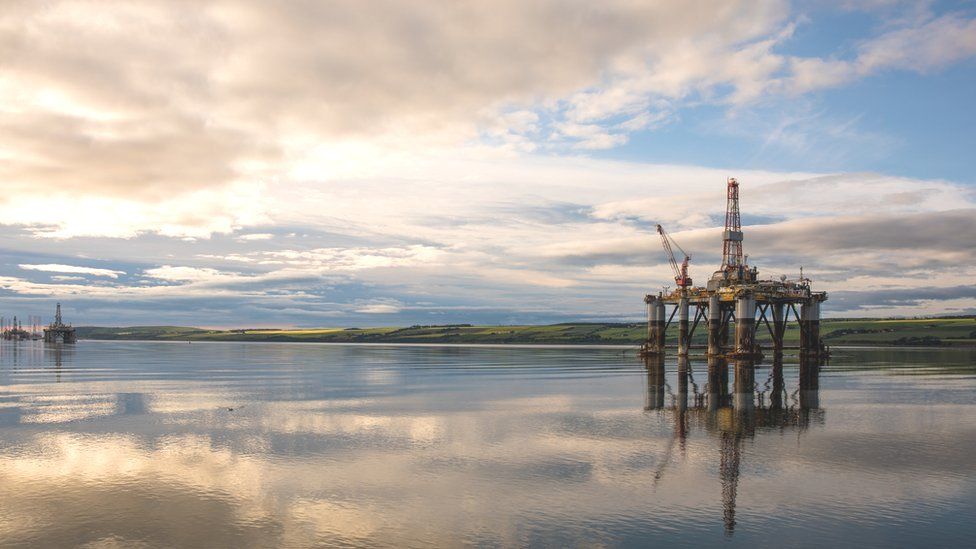What is the windfall tax on oil and gas companies and how much do they pay?
- Published
- comments

The government has introduced changes to the windfall tax on oil and gas companies that will stop it early if energy prices fall a long way.
The Energy Profits Levy was introduced in May 2022.
What is a windfall tax?
A windfall tax is a levy imposed by a government on companies that have benefited from something they were not responsible for - in other words, a windfall.
Energy firm profits have soared in recent years, initially due to rising demand after Covid restrictions were lifted, and then because Russia's invasion of Ukraine raised energy prices.
The levy applies to profits made from extracting UK oil and gas, but not from other activities, such as refining oil and selling petrol and diesel on forecourts.
How much money have energy firms been making?
BP reported profits of $2.5bn (£2bn) between April and June, down from $8.4bn in the same period last year. For the whole of 2022, it made $27.2bn (£21.8bn).
Shell reported profits of $9.6bn for the first three months of 2023, which was higher than the same period last year despite falling energy prices. For the whole of 2022 it made profits of $39.9bn (£32.2bn), the highest in its 115-year history.
BP says its UK businesses account for less than 10% of its global profits, while Shell makes about 5% of its revenue in the UK.
Both firms argue they lost a lot of money after stopping investments in Russian oil firms.
British Gas owner Centrica made £3.3bn for 2022, more than triple the £948m total for 2021.
Most came from its nuclear and oil and gas business, rather than the British Gas retail energy supply business, which contributed £72m.
All three firms have increased their dividend payments - the money they give directly to shareholders.
They are also spending billions (£300m in Centrica's case) buying back their own shares from the market, in order to increase their value.
How does the new windfall tax work?
Prime Minister Rishi Sunak introduced the 25% Energy Profits Levy in May 2022 when he was chancellor.
In the 2022 Autumn Statement, the current Chancellor, Jeremy Hunt, said the levy would increase to 35% from January 2023, and run until March 2028. It was previously due to finish in 2025.
Mr Hunt said the tax would raise £40bn over six years.
On 9 June 2023 the government announced a change to the policy that would mean that the windfall tax will end if oil and gas prices fall below a certain level for six months.
For the tax to be halted, average oil prices must fall to, or below, $71.40 per barrel, and £0.54 per therm for gas, for two consecutive quarters.
In last year's Autumn Statement, the government also introduced a temporary 45% levy on what it calls "extraordinary returns" from low-carbon electricity generators in the UK.
Larger operators started paying the Electricity Generator Levy on 1 January. The government hopes it will raise about £14bn over six years.
How much are companies paying under the levy?
In the first six months of 2023, BP paid $970m (£755m) of tax in the UK - with about $460m (£358m) due to the EPL.
Shell initially said it did not expect to pay any windfall tax for 2022, as its North Sea investments meant it was not considered to have made any UK profits.
But on 2 February it announced that it would pay $134m (£108m) for 2022, and expected to pay more than $500m (£400m) for 2023.
Centrica said it was paying about £1bn in tax from its £3.3bn 2022 profits, which includes about £54m under the levy.
How much tax do oil companies usually pay?
Oil and gas firms operating in the North Sea are taxed differently.
They pay 30% corporation tax on their profits and a supplementary 10% rate on top of that. Other firms with profits over £250,000 a year currently pay 25% corporation tax.
But oil and gas firms have been able to reduce the amount of tax they pay by factoring in losses or spending on things like decommissioning North Sea oil platforms.
Both firms received more money back from the UK government than they paid every year from 2015 to 2020 (except Shell in 2017).
Shell also paid a negative amount of tax in 2021, taking its 2015 to 2021 UK tax total to -£685m.
BP paid more money in tax than it received back in 2021, taking its total for the same period to -£107m.
Will the windfall tax affect investment in oil and gas?
In March 2022, Shell said it would spend between £20bn and £25bn on UK energy over the next decade.
But in November, UK boss David Bunch said the company would "have to evaluate each project on a case-by-case basis", because the windfall tax meant it had "less to invest".
BP plans to spend up to £18bn on the UK's energy system by 2030.
In May 2022, chief executive Bernard Looney said all planned UK investments would continue.
But in December 2022, French oil company TotalEnergies said it would cut its planned 2023 North Sea investment by a quarter - £100m - because of the extension to the windfall tax.